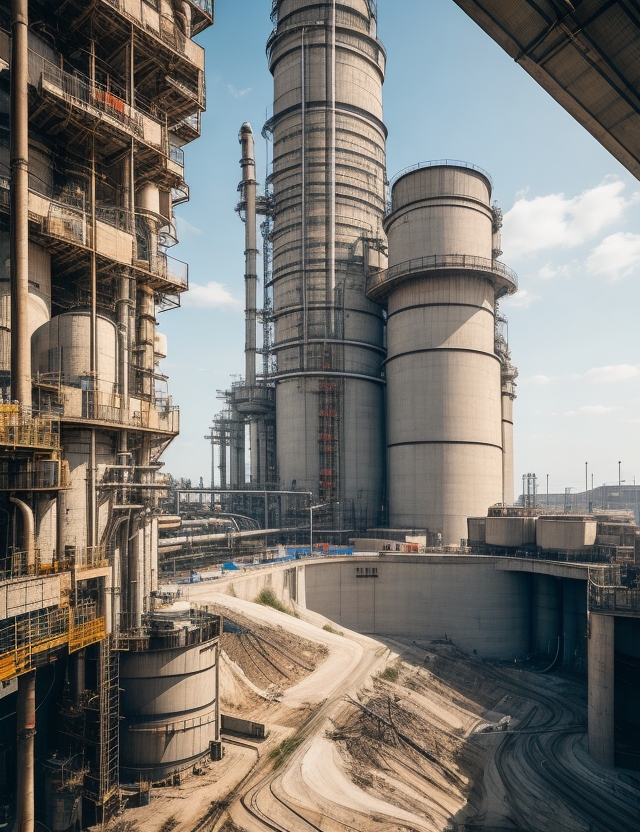Building the nation of Nigeria with bricks and mortar has become an increasingly important economic endeavor. From massive infrastructure projects to small-scale commercial activities, cement and concrete play a critical role in the African nation’s development. As such, Nigeria is increasingly becoming a destination for manufacturers of Portland cement. But what exactly is Portland cement, and how can Nigerian citizens and businesses ensure the quality of the product they purchase? This blog post will explore the secrets of Portland cement manufacturing in Nigeria, revealing the methods and technology available to ensure a reliable supply of high-quality cement. Portland cement is the most common type of cement, widely used in the construction industry in Nigeria. It is made from a special blend of materials such as calcium, silicates, and iron oxides, which are heated and then grounded into a fine powder. The process of producing Portland cement is complex, requiring advanced engineering and knowledge of materials science. The high-temperature kilns used to manufacture Portland cement require sophisticated machinery and specialized technicians to ensure that the process runs efficiently. With the increasing demand for construction materials in Nigeria, it is imperative that Nigerian cement manufacturers have the right technology and expertise to meet the needs of their customers. That is why many manufacturers in Nigeria are turning to the latest advances in the technology of Portland cement production. Using the latest high-tech equipment and software, Nigerian cement manufacturers are able to ensure that their products meet the highest standards in quality control. From controlling the chemical composition to tracking the temperature of the kiln, manufacturers in Nigeria are able to maintain detailed records of their cement production process and ensure the highest quality product is delivered to their customers. By unlocking the secrets of Portland cement manufacturing in Nigeria, businesses and individuals in the country can be sure that they are receiving the best product for their needs and that their money is going towards the construction of a strong, safe, and prosperous Nigeria.
Challenges Facing Portland Cement Manufacturers in Nigeria
As with any industry, there are a number of challenges facing Portland cement manufacturers in Nigeria. The first of these is the high cost of production. Nigeria is an oil-producing country, and the cost of crude oil has an effect on the cost of other raw materials used in cement production. Additionally, the cost of labor is also a factor, as it is more expensive to hire experienced technicians than it is to hire unskilled laborers. As a result, many manufacturers in Nigeria are unable to keep up with the demand for their product. The second challenge for Portland cement manufacturers in Nigeria is the lack of skilled labor. Many of the technicians that are employed to run the high-tech machinery required for cement production do not have adequate experience. This can lead to production errors, which can have serious consequences for the quality of the output. Finally, there is an issue of infrastructure. Many of the roads and railways in Nigeria are in disrepair, making it difficult to transport materials and machinery to the manufacturing sites.
Opportunities for Investment in Portland Cement Manufacturing in Nigeria
Despite the challenges facing Portland cement manufacturers in Nigeria, there are still numerous opportunities for investment. Firstly, the demand for construction materials in the country is growing at a rapid rate, and the government is actively encouraging local businesses to become involved in the production process. Secondly, the government is offering incentives and tax breaks to companies that invest in the industry. This has enabled many businesses to make significant investments in producing Portland cement in Nigeria. Finally, recent technological advances have enabled companies to produce Portland cement with greater efficiency and at lower costs. This has enabled businesses to compete more effectively with international competitors, who often have access to better technology and resources. By investing in the latest technology and equipment, companies in Nigeria can capitalize on the growing demand for Portland cement and obtain a competitive advantage.
Factors Affecting the Cost of Portland Cement in Nigeria
The cost of Portland cement in Nigeria is affected by a number of factors. Firstly, the cost of the raw materials used in the production process can have a significant impact on the overall cost of the product. The cost of oil in particular can have a significant effect, as it is one of the primary raw materials used in cement production. Additionally, the cost of labor can also affect the cost of Portland cement, as it costs more to hire experienced technicians than unskilled laborers. Finally, the cost of transportation is another factor that can affect the cost of Portland cement in Nigeria. In addition to the cost of raw materials and labor, the cost of Portland cement in Nigeria is also affected by the efficiency of the manufacturing process. Companies that employ the latest technology and utilize the most efficient processes can produce a higher quality product at a lower cost. As a result, businesses that invest in the latest equipment and processes can significantly reduce the cost of their product.
The History of Portland Cement in Nigeria
Portland cement has been used in Nigeria for centuries, with the earliest recorded production dating back to the mid-19th century. Over the years, the industry has grown significantly and, today, there are numerous cement manufacturing companies operating in the country. Additionally, the use of Portland cement in the construction industry has become increasingly important, with the government actively promoting investment in the industry.
In recent years, the growth of the Nigerian cement industry has been aided by technological advances that have enabled manufacturers to produce higher-quality cement at a lower cost. Additionally, the government has implemented various incentives and tax breaks to encourage investment in the industry. As a result, the demand for Portland cement in Nigeria is expected to continue to grow in the coming years.
Conclusion
Portland cement is a vital material in Nigeria’s construction industry, and its production requires sophisticated technology and knowledge of materials science. By unlocking the secrets of Portland cement manufacturing, businesses and individuals in Nigeria can be sure they are receiving the best product for their needs and that their money is going towards the construction of a strong, safe, and prosperous nation. Through investment in the latest technology and processes, businesses in Nigeria can capitalize on the growing demand for Portland cement and obtain a competitive advantage. Finally, understanding the factors that affect the cost of Portland cement can help businesses and citizens in Nigeria make the most informed choice when selecting a cement for their construction projects.



